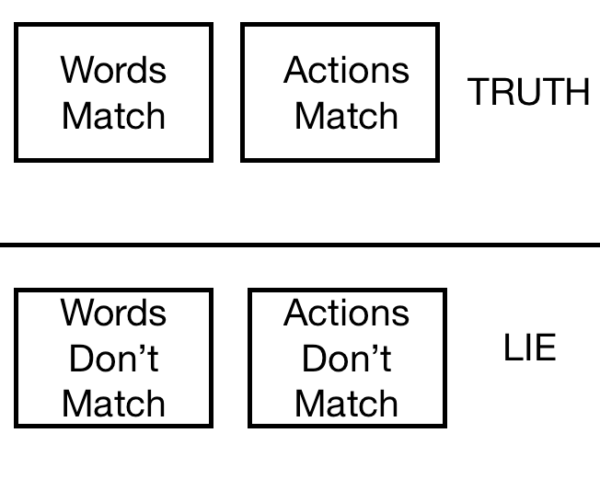There are seven core ways in which you can tell your ex is lying.
How do I know?
Because I literally interviewed a body language expert and psychologist and asked him.
See this guy,
Ya, this is Dr. John Paul Garrison, a psychologist and body language expert, his work has been featured in numerous media outlets, including Business Insider, Forbes, Vice, Huffington Post, Yahoo News, Real Simple, and Fatherly.
But perhaps he’s most widely known for his work on YouTube where he dissects the body language of some of the most notorious murderers.
Anyways, for an hour straight I picked his brain on the major “tells” that an ex will exhibit after a breakup (or even during one) that can help you determine if they are lying to you.
In short, they are,
- Understanding the interconnected nature of body and emotion
- Liars grow anxious when they lie
- They begin to self soothe
- They are actually quite good at “living the lie” until they lose control
- Expect defensive behaviors
- It’s important to trust your gut when it comes to lying through texting specifically
- Applying the words vs. actions mentality
I can’t wait to get started!

What Are Your Chances of Getting Your Ex Boyfriend Back?
Take the quizCore Factor #1: Understanding The Interconnected Nature Of Body And Emotion
The first core factor is understanding the interconnectedness of body language and emotion.
So, one of the first things that Dr. G emphasized when I asked him about identifying lies is the fact that body language hinges on recognizing the interconnectedness of our feelings and bodies.
Basically, major emotions like guilt, anger, anxiety find a way to manifest themselves in our physical demeanor.
Therefore, if you learn to read your ex’s body language, you can theoretically pinpoint if they’re being deceptive.
In the interview I linked to above Dr. G specifically stated,
‘Understanding that body language, at its core, recognizes a couple of things. One is that our feelings are connected to our bodies. If you believe body language is readable, you must accept that when you’re feeling angry, it’s going to show on your face, your anxious body, and so on. Our brain and bodies are interconnected. Good science supports this, but you have to agree with it to believe body language is readable.’
The overarching way to determine if your ex is lying to you is by closely observing their body language.
Many people are naturally adept at this because they’ve spent so much time with their ex, understanding their normal body language, and can discern any deviations from the baseline.
Core Factor #2: Liars grow anxious when they lie
The second core factor is that liars become anxious when they lie. Dr. G states,
‘If you want to read lying and deception, recognize that most people don’t like to lie. It makes us anxious. We get nervous when we lie, at least for those of us who are not psychopaths. Psychopaths don’t get nervous when they lie, but that’s a different discussion.’
Therefore, any signs of nervousness or anxiety could be an indication that your ex is lying.

What Are Your Chances of Getting Your Ex Boyfriend Back?
Take the quizInterestingly, some of Dr. G’s most popular YouTube videos focus on true crime, dissecting the behavior of murderers and some of the most psychopathic individuals.
When I asked him about it, he said that even psychopaths display anxiety when lying, usually because they’re afraid of getting caught.
He said,
‘True crime body language is often an exaggeration of what we see with everyone else. They might show a little less in some ways or exaggerate in others, but it’s still human behavior. Disturbed individuals may do more awful things, but their body language is still relatively similar.’
Some might think their ex is an exception, having a hard time determining if they’re lying.
But if even the most extreme personalities show these signs, it’s unlikely that your ex is an exception.
Core Factor #3: They begin to self soothe
This behavior is often an extension of anxious behaviors: individuals who are anxious frequently try to self-soothe.
You may start to notice them protecting vulnerable areas such as:
- Their head
- Neck
- Abdomen
- Chest.
They may lick their lips or touch their face, among other things.
Dr. G elaborates for us,
‘In terms of the idea that people need to be anxious to show deception and lying, that usually means when you’re uncomfortable, you’re likely to want to protect yourself in some way. Your head and body are very vulnerable areas if we’re talking about this from a survival standpoint. Another important part to consider is that the body is incredibly adept at survival. Humans instinctively seek to survive, so we do many things to protect ourselves. Often, when people feel uncomfortable, they protect their abdomen or chest, their face, or they engage in self-soothing behaviors. Our lips have numerous nerves, so people often lick their lips when nervous because it calms them. Men tend to stroke their neck, women tend to touch their face, among other things.’
To add to this, in my interview with Dr. G, I learned that, from a body language perspective the best way to tell if someone is genuinely engaged or interested, and not deceiving you, is if they:
Do not attempt to protect themselves.
They expose their vulnerability: for example, when hugging you, they open their arms wide, embodying vulnerability.
They lean in, not back.
This ties back to the aspect of self-soothing.
Someone who is lying will feel the need to self-soothe, while someone who isn’t lying won’t feel this need.
Core Factor #4: They are actually quite good at “living the lie” until they lose control
This is best explained with a direct quote from Dr. G:
‘If they’re being manipulative and lying without being asked questions, if they’re sadistic and enjoy hurting people, in essence, if they’re good at lying and it’s just them spinning their web of lies, it’s harder to read. If you’re asking them questions, that’s when telltale signs will surface.’ As an example, let’s consider infidelity. They come home from cheating, casually claiming to have returned from the gym. They may not feel much anxiety in this scenario. However, if someone probes and asks, ‘where were you?’, they’ll likely experience a spike in anxiety. They can be convincingly deceptive when they’re controlling what they say. But once they’re under scrutiny and someone is questioning them, their body language gives them away.
A common scenario on Dr. G’s YouTube channel illustrates this: police interrogations.
In these situations, the suspect, sometimes the guilty party, has lost all control.

What Are Your Chances of Getting Your Ex Boyfriend Back?
Take the quizAs a result, they start self-soothing.
Interestingly, one of the best ways to identify a liar is to remove their control of the situation by asking them direct questions without making accusations.
This tactic often leads to observable self-soothing behaviors, or our core factor number five, defensive behaviors.
Core Factor #5: Expect defensive behaviors
Defensive behaviors are fairly straightforward.
Gaslighting is probably the most common one we see in our community.
Let’s return to Dr. G’s infidelity example above.
Your ex, having cheated on you, comes home and insists they were at the gym. You question their truthfulness. They become defensive, and their primary defensive strategy is to gaslight you, accusing you of always being mistrustful.
This manipulation makes you feel like the villain for merely questioning their fidelity. If you observe an uptick in their defensive behaviors, it could indicate deceit.
As Dr. G said,
‘With lying, we often see pacifying behaviors and then defensive behaviors, appearing in various ways.’ Notice he mentions pacifying behaviors (or self-soothing) first, followed by defensive behaviors. This progression seems to be a cause-and-effect scenario: they first attempt to pacify, which can happen quite swiftly. However, when pacification doesn’t work and you maintain the pressure, they become defensive. That’s when they start gaslighting, showing anger, or trying to evade the situation entirely.
Core Factor #6: It’s important to trust your gut when it comes to lying through texting specifically
Most of my discussion with Dr. G pertained to body language, which requires in-person interaction, questioning, and observation.
However, I was curious about whether any of these concepts could apply to text messaging.
When I asked Dr. G about this, he responded,
‘Lying and deception is a psychological manipulation as well. Yes, the rules might be different for text messaging, but the best way to identify if someone is lying is to trust your gut.’
This is an aspect many people neglect.
Often, they feel anxious but dismiss their feelings, thinking they shouldn’t feel that way. It’s crucial to trust your gut and learn to recognize red flags, especially in text and voice messages.
However, I’d add an amendment to that statement: it’s crucial to cultivate an informed trust of the gut.
What does this mean?
Let’s say your ex routinely texts you at a particular time of day and then suddenly stops doing so.
This context clue may hint at deceit.
A drastic change in texting patterns related to a suspected lie can also be a trigger.
Often, when clients discuss what sets their gut instincts off, it’s usually because they have a well-established baseline of how the person usually communicates via text or voice note.

What Are Your Chances of Getting Your Ex Boyfriend Back?
Take the quizAny deviation from the norm can help identify potential deception.
So, trust your gut when you notice something is off with the baseline.
Core Factor #7: Applying the words vs. actions mentality
Although this wasn’t directly discussed with Dr. G, I believe it’s important to include because it’s a common-sense test.
Exes, particularly those with narcissistic tendencies, may say things to draw you back in.
One way to gauge their authenticity is by applying the words versus actions mentality.
Actions can often tell you where a person’s mind truly is, so it’s important not to be swayed by their words alone.
If their actions support their kind words, they’re likely telling the truth. However, if their actions contradict their words, they are probably lying or deceiving you.
Applying this common-sense test across all elements from a bird’s eye view can help you determine if your ex is lying.


Mahira
May 13, 2025 at 8:06 pm
Hey, I wanted to ask you something because I’ve been questioning myself a lot.
So my ex said he needed space, and I gave it to him. A few days later, he came back saying things like “you deserve better,” “it’s not you, it’s me,” and all that. The thing is, right before he said all that, I was telling him I loved him, calling him “baby,” and saying how glad I was that he was mine. Then out of nowhere, he dropped that breakup speech.
I agreed with him. I told him, “You’re right, I do deserve better. I need someone who actually loves and cares for me. And honestly, I’m happy without you.”
Then he got annoyed and said, “So why were you trying to fix the relationship then?” He seemed angry.
I replied, “You know what? I thought I’d be really upset about you breaking up with me. I thought I’d have anxiety and all that. But I’m not. I’m not mad or angry I actually feel normal.”
He went quiet after that and then said, “I don’t want to talk to you,” and ended the call.